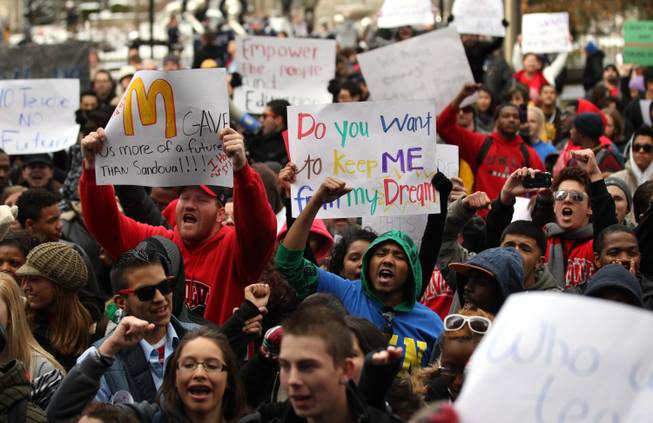
AP Photo/Cathleen Allison
Hundreds of college students swarmed the Legislature in Carson City on Monday, March 21, 2011, during a rally protesting proposed budget cuts to higher education.
Wednesday, Jan. 18, 2012 | 2 a.m.
Sun coverage
For all the talk about diversifying Nevada’s economy, consider a new federal report being released this week that found per-student funding for the state’s major public research universities has been cut by nearly a third during the past decade.
Nationally, states reduced per-student funding for universities by a fifth from 2002 to 2010, according to new data released Tuesday by the National Science Board. The 575-page “Science and Engineering Indicators” report tries to identify trends and factors that affect the nation’s competitiveness in high-tech industries.
“There is less capacity to do the fundamental research history shows benefits our nation,” board Chairman Ray Bowen said during a telephone conference with reporters.
State funding for the top 101 public research universities has fallen by 10 percent in the past decade, adjusted for inflation, according to the biennial report. Nearly three-quarters of the universities in the study experienced reductions in state funding — the sharpest decline occurring shortly after the recession.
At the same time, higher education enrollment has boomed to more than 20 million nationwide, causing a strain on universities forced to serve more students with fewer resources, according to the report.
The report raised concern about how funding declines affect the United States’ ability to continue producing an educated workforce that can compete globally in high-knowledge fields such as technology, Bowen said.
The number of bachelor’s degrees in science and engineering awarded nationally has risen steadily over the past decade, reaching a peak of about half a million degrees in 2009. Still, the United States’ output in engineering degrees accounts for just 4 percent of all degrees awarded nationally; in China, about 34 percent of degrees awarded are in engineering, Bowen said.

UNLV President Neal Smatresk
The study’s findings came as no surprise to UNLV President Neal Smatresk, who has seen the university lose nearly $50 million in state funding in the past five years. As a result, UNLV was forced to shed more than 700 faculty positions and eliminate 19 departments and degree programs, he said.
To offset the budget cuts, tuition at UNLV has increased each year since the recession began, with the latest — an 8 percent hike — approved last month by the Nevada System of Higher Education. Smatresk attributes the tuition hikes to the loss of about 3,000 students over the past three years.
“When you cut, you diminish your capacity to increase the number of people with higher degrees,” he said. “We’re trying to make lemonade in this situation.”
The percentage of the population with college degrees is an important indicator of a region’s economic health, Smatresk said. High growth industries — such as technology and renewable energy companies — are attracted to states with a highly educated population from which to draw their employees, he said.
Currently, 20 percent of Southern Nevadans have bachelor’s degrees or higher, Smatresk said, causing some companies to overlook Las Vegas. To attract more companies — and jobs — to the state, Nevada will need to double and eventually triple its percentage of college graduates, he said.
When budgets are slashed, that goal becomes harder to attain, Smatresk said.
“We want higher education to be seen as an investment and not a cost,” he said. “We’re an engine for this economy. You have to invest to get a return, and there’s no better investment than higher education.”

Join the Discussion:
Check this out for a full explanation of our conversion to the LiveFyre commenting system and instructions on how to sign up for an account.
Full comments policy